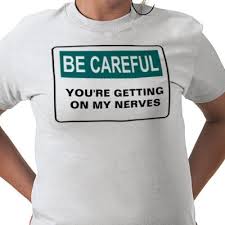Today I’d like to write about the expression “get on someone’s nerves”. We use it when we want to talk about something or someone that really irritates another person. Here are some ways to use it in sentences.
I hate the sound of whistling. It really gets on my nerves.
Jeff is constantly bragging about winning the bowling competition and he’s really getting on my nerves.
Kids, please go outside and play your drums there. I think you’re getting on your mother’s nerves.
A: What kind of things get on your nerves?
B: People who spit on the street really get on my nerves.
We almost always use this expression in the simple present tense or the present continuous tense.
We often use it to talk about things that irritate ourselves such as in the first, second and fourth examples.
Please be careful not to confuse the word “nerves” with “nervous”. The word “nervous” has a different meaning. We use that adjective to describe a situation in which a person feels a little scared before doing something.









